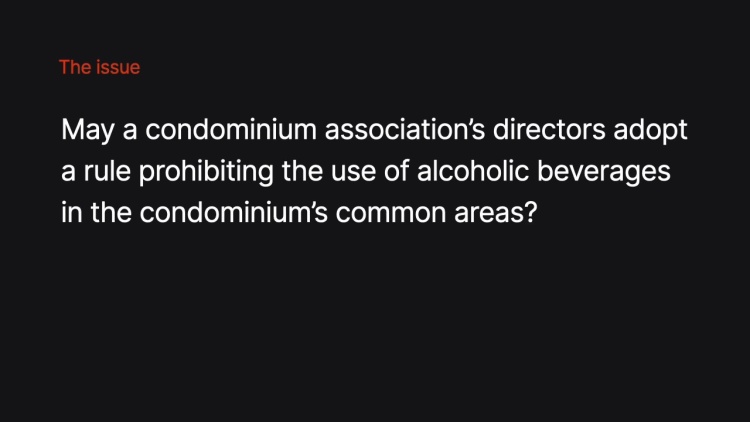Hidden Harbour Estates, Inc. v. Norman
Florida District Court of Appeal
309 So. 2d 180 (1975)
- Written by Abby Roughton, JD
Facts
Hidden Harbour Estates, Inc. (the association) (defendant) was the condominium association formed to operate a 202-unit condominium called Hidden Harbour. Pursuant to the association’s articles of incorporation, the association was authorized to make and amend reasonable rules and regulations governing the use of condominium property. The association adopted a rule prohibiting the use of alcoholic beverages in Hidden Harbour’s clubhouse, which was a common area of the condominium used for social events. Owners within Hidden Harbour approved of the rule by a two-to-one margin. Bradford and Evelyn Norman (plaintiffs) owned a condominium unit in Hidden Harbour and did not like the no-alcoholic-beverages rule. The Normans sued the association in Florida state court, seeking injunctive relief to prohibit the association from enforcing the rule. At trial, the Normans presented evidence that no incidents had occurred at the clubhouse during events where alcohol had been consumed. The trial court ultimately entered a permanent injunction prohibiting the association from enforcing the rule. The trial court found that condominium residents had the right to engage in lawful actions in the clubhouse or other common areas of Hidden Harbour unless the actions were conducted in a way that constituted a nuisance. The association appealed.
Rule of Law
Issue
Holding and Reasoning (Downey, J.)
What to do next…
Here's why 911,000 law students have relied on our case briefs:
- Written by law professors and practitioners, not other law students. 47,100 briefs, keyed to 997 casebooks. Top-notch customer support.
- The right amount of information, includes the facts, issues, rule of law, holding and reasoning, and any concurrences and dissents.
- Access in your classes, works on your mobile and tablet. Massive library of related video lessons and high quality multiple-choice questions.
- Easy to use, uniform format for every case brief. Written in plain English, not in legalese. Our briefs summarize and simplify; they don’t just repeat the court’s language.





